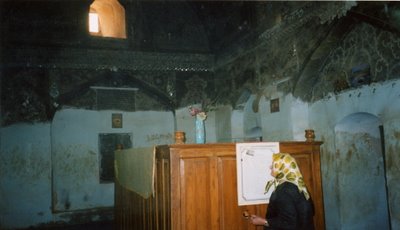Report by Michele Dargan in the Palm Beach Daily News. (With thanks: Albert, and a special correspondent)
"(...) Nasser M Al Belooshi spoke to more than 50 members and guests of the American Jewish Committee at The Colony. AJC honorary board members Nancy and Mark Gilbert hosted the cocktail reception.
"Al Belooshi, who resides in Washington, D.C., came to the United States in 2003 to coordinate and expedite the signing of the U.S./Bahrain free-trade agreement. The agreement was signed in 2004 and ratified last year. He was appointed ambassador in 2005.
"Al Belooshi also discussed the history of Jewish residents in Bahrain.
"In the early 1900s, many Jewish immigrants from Iraq, Iran and India settled in Bahrain. When Israel was formed in 1948, most of the Jews left Bahrain.
Most Jews did not leave when Israel was formed, but in reaction to local Partition riots in 1947 which destroyed the synagogue and claimed two Jewish lives.
"Today there are 70 to 100 Jews living in Bahrain, but that number is on the rise, Al Belooshi said.
Wrong: there are 30 Jews in Bahrain, though numbers fluctuate if you include Jews serving with the American Fifth Fleet.
"Bahrain has always been inclusive of all religions — Jewish, Christians, Muslims, Hindus, Baha'is and Sikhs — whose adherents live side-by-side and are productive members of society, he said.
"Al Belooshi made frequent mention of Bahrain's longtime friendship with the United States. An island nation nestled midway between Saudi Arabia and the peninsular nation of Qatar in the Persian Gulf, Bahrain is the home port for the U.S. Navy's Fifth Fleet.
"He said the Gulf States "feel very unsafe because of the nuclear ambitions of Iran," which Bahrain opposes.
"We need to see a more united front against this," he said. "America has always been a country that has helped. I hope (the U.S.) will help and push for peace in that region."
"Bahrain is the only Gulf State that has given Jews land for a synagogue and there has been a well-maintained synagogue for 100 years," he said.
Wrong: the Jews jointly acquired land out of town during the 1920s for a synagogue. It was destroyed during Partition riots in 1947, and the Jews put up a high wall around the compound so that it became inaccessible. Over the years, the town expanded, and the compound became very valuable because of its location. The rulers of Bahrain offered to pay for the land, and provide the Jews with a piece of land outside town in order to build a synagogue. The Jews refused. They argued that no one would build another Synagogue out of town, and if this piece of land were given up, there would be nothing to show that there was a community in Bahrain. So about five years ago, the synagogue was rebuilt. There are no services there, but it stands for all to see.
"Bahrain also was the only country to have offered American missionaries in 1888 land on which to build a church. The synagogue and the church still exist as emblems of Bahrain's tolerance of all religions."*
Al Belooshi was asked if Bahraini officials are afraid that radical groups may target his country because of its alliance with the United States.
Twenty-five thousand Americans and their dependents from the Fifth Fleet live in Bahrain and a half-million Americans pass through the country each year, he said.
"We are an island and islands can protect themselves in a better way," he said. "Yes, we are afraid, but our responsibility is bigger than other countries. Just imagine an American killed in Bahrain. It would be a disastrous situation. That's why we have to be careful not once, not twice, but 100 times. That's why we have a very strong intelligence relationship with the U.S. and Great Britain."
*Bahrain's Jews have benefited from the protection of the island's rulers, but as in Iran have been known to suffer from the widespread Shi'a popular prejudice that the Jews are 'unclean'. One Jew who used to install TVs in people's homes would be invited for a Coke. But his hosts would never drink with him and he would discover the glass he had drunk from had been thrown away.


